Department of Nursing
School of Health, Social Care and Life Sciences

DEMENTIA ENHANCED EDUCATION TO
PROMOTE EXCELLENCE (DEEPE)
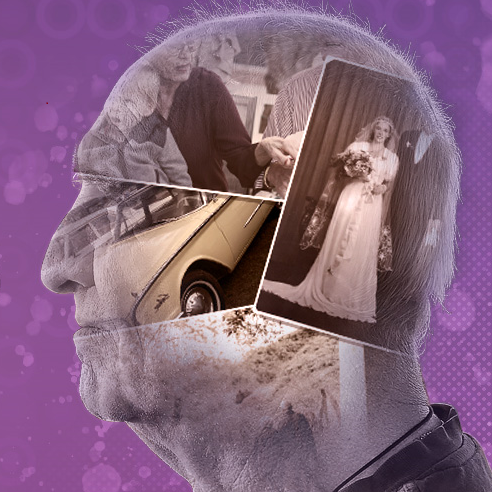
Endorsements for DEEPE
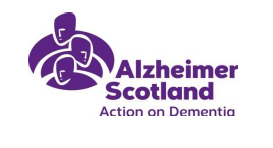
Author:
Dr Leah Macaden
Lecturer, Department of Nursing, School of Health, Social Care & Life Sciences, University of the Highlands & Islands
Centre for Health Science, Old Perth Road, Inverness
leah.macaden@uhi.ac.uk
Acknowledgment:
Campus Coordinators
Dr Leah Macaden (Highland Campus, Department of Nursing, School of Health, Social care & Life Sciences, University of the Highlands and Islands)
Mrs Lesley Andrews (Western Isles Campus, Department of Nursing, School of Health, Social care & Life Sciences, University of the Highlands and Islands)
Welcome
Welcome to this new and exciting Dementia curriculum: DEEPE (Dementia Enhanced Education to promote Excellence) that will be delivered throughout your Nursing programme over three years. This teaching and learning resource has a very clear and defined focus to support you with caring for the person living with dementia and for those who care and support them. The aim of this curriculum is to provide all of you as nursing students in both the adult and mental health branches with a comprehensive range of dementia specific teaching and learning opportunities. It will also give you access to relevant knowledge and skills that would build your confidence and enhance your competence in caring for individuals with dementia, their families and carers.
DEEPE integrates the philosophy of care within the ‘Standards of Care for Dementia in Scotland’ (Scottish Government 2011) and ‘Promoting Excellence: A framework for all health and social services staff working with people with dementia, their families and carers', (Scottish Government 2011) underpinned by the three 'National Dementia Strategies for Scotland' (National Dementia Strategy for Scotland, 2010, 2013, 2017).
The curriculum content for DEEPE is student-centered and innovative, integrating technology and equipping students for the roles they will assume in practice. It is closely linked to health and social care needs of a person living with dementia in an ageing society, thus making it contextually relevant. The curriculum process also emphasizes the use of active learning strategies that will enhance both critical thinking and clinical reasoning. Content within the DEEPE curriculum is mapped along the stages of the dementia journey and includes a comprehensive range of topics that include both the early and advanced stages of dementia.
DEEPE includes core components that are relevant for dementia practice and covers comprehensively on types of dementia, post diagnostic support, improving community connections, assessment of cognition, function and behaviour, stress and distress, differentiating dementia, delirium and depression, impact of polypharmacy on cognition, end of life care including assessment and management of pain, carer support, and the role of environment and assistive technology. Additionally, students will be trained using Barbara’s Story, a series of 6 films (https://www.youtube.com/watch?v=DtA2sMAjU_Y) and a very powerful resource created by nurses at Guy's and St Thomas' to raise awareness of dementia among staff which has changed attitudes to dementia in hospitals across the world.
Teaching and learning methods include a combination of lectures, skills workshops, small group discussions, interactive web based resources, self-learning, and reflection. DEEPE will be accessible via Black Board (Your Virtual Learning Environment – VLE) within a separate folder for the duration of your programme over 3 years.
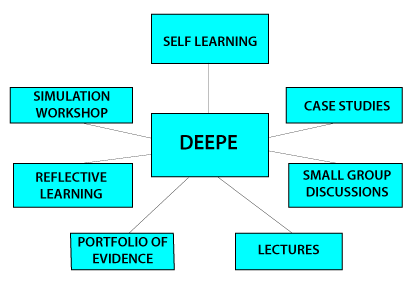
You must evidence your engagement with these resources throughout the programme and build a portfolio that evidences completion of all the requirements. Evidence of completing your DEEPE portfolio requirements (Sample Template available on pages) will need to be signed off by YOUR Personal Academic Tutor (PAT) alongside the Ongoing Achievement Record (OAR) each Semester. On completion of the portfolio, you will be able to be receive the Certificate of Achievement highlighting your learning and competence at the ‘Enhanced Level’ within the Promoting Excellence Framework.
Background and context
DEEPE is strategic within the current global health priorities, underpinned by Scottish policy, delivered using a partnership approach (Alzheimer Scotland, NHS Highland and NHS Western Isles) through collaborative and shared learning and linked to the Promoting Excellence Framework.
DEEPE is also a proactive response to Scotland’s National Action Plan for Dementia to develop the future nursing work force against the Promoting Excellence Framework.
Dementia policy documents
- Charter of Rights for People with Dementia from the Standards of Care for Dementia in Scotland, June 2011 http://www.scotland.gov.uk/Resource/Doc/350188/0117212.pdf
- National Dementia Strategy for Scotland, 2010, 2013 and 2017 http://www.scotland.gov.uk/Resource/Doc/324377/0104420.pdf
and http://www.scotland.gov.uk/Topics/Health/Services/Mental-Health/Dementia/DSPropositionPaper2013-16 - Promoting Excellence: A framework for all health and social services staff working with people with dementia, their families and carers http://www.scotland.gov.uk/Resource/Doc/350174/0117211.pdf (- June 2010)
Scotland's dementia journey (2007 - 2017)
Year |
Milestone |
| 2007 | Dementia made a National Priority |
| 2010 | The First landmark National Dementia Strategy (2010 – 2013) |
| 2011 | Standards of Care for Dementia in Scotland |
| 2011 | The Dementia Champions Initiative (Health) |
| 2011 | The Five Pillar Model of Post Diagnostic Support (Named Link Worker) |
| 2012 | The Eight Pillar Model of Community Support (Practice Coordinator) |
| 2012 | Dementia Nurse Consultant in every Health Board |
| 2012 | Introduction of Dementia Ambassadors (Social Care) |
| 2011 | Promoting Excellence: A framework for all health and social services staff working with people with dementia, their families and carers |
| 2013 | The Second National Dementia Strategy (2013 – 2016) and the 10 Point National Action Plan |
| 2017 | The Third National Dementia Strategy (2017 – 2020) |
Charter of rights for people with dementia
Charter of Rights for People with Dementia from the Standards of Care for Dementia in Scotland, June 2011
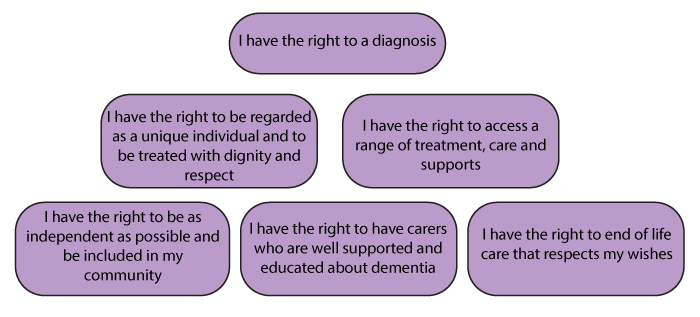
http://www.scotland.gov.uk/Resource/Doc/350188/0117212.pdf
Implementing the standards of care
Implementing the standards of care for dementia in Scotland in hospitals - the 10 point national action plan
| 1. | Identify a leadership structure within NHS Boards to drive and monitor improvements |
| 2. | Develop the workforce against the Promoting Excellence KSF |
| 3. | Plan and prepare for admission and discharge |
| 4. | Develop and embed person-centred assessment and care planning |
| 5. | Promote a rights-based and anti-discriminatory culture |
| 6. | Develop a safe and therapeutic environment |
| 7. | Use evidence-based screening and assessment tools for diagnosis |
| 8. | Work as equal partners with families, friends and carers |
| 9. | Minimise and respond appropriately to stress and distress |
| 10. |
Evidence the impact of changes against patient experience and outcomes |
http://www.gov.scot/Topics/Health/Policy/Dementia
Levels of practice
The Promoting Excellence Framework provides us with a clear indication of the knowledge, skills and behaviour that are required by any individual who has infrequent (informed level of practice), substantial contact (skilled level of practice), regular and intense contact (enhanced level of practice) and as a provider of specialist care (expertise level of practice). As a nursing student, you will have a range of practice learning experiences where you will be meeting and caring for individuals with dementia. This has prompted the school to ensure that this learning resource has been shaped and designed to provide you with the opportunity to develop the professional skills, knowledge and confidence to deliver an Enhanced Level of Practice in dementia care.
Expertise in Dementia Practice LevelOutlines the knowledge and skills required for health and social care staff who by virtue of their role and practice setting, play an expert specialist role in the care, treatment and support of people with dementia |
Enhanced Dementia Practice LevelDescribes the knowledge and skills required by all staff that have direct and/or substantial contact with people with dementia and their families and carers |
Dementia Skilled Practice LevelDescribes the knowledge and skills required by all staff that have direct and/or substantial contact with people and their families and carers |
Dementia Informed Practice LevelProvides the baseline knowledge and skills required by all staff working in health and social care settings including a person's own home. |
Source: http://www.scotland.gov.uk/Resource/Doc/350174/0117211.pdf
The students' journey through DEEPE
Students progress through the Promoting Excellence Framework incrementally over 3 years.
|
Semesters 5 and 6 (Enhanced level) |
Year 3 |
|
Semesters 2 - 4 (Skilled level) |
Year 2 |
|
Semester 1 (Informed level) |
Year 1 |
Stages of the dementia journey
The programme content has been mapped over the semesters and aligns with the Stages of the Dementia Journey:
| Keeping well, prevention, and finding out it is dementia |
| Assessment and diagnosis, making sense of it all |
| Living well with dementia |
| Living well with increasing help and support |
| End of life and dying well |
Why is DEEPE required?
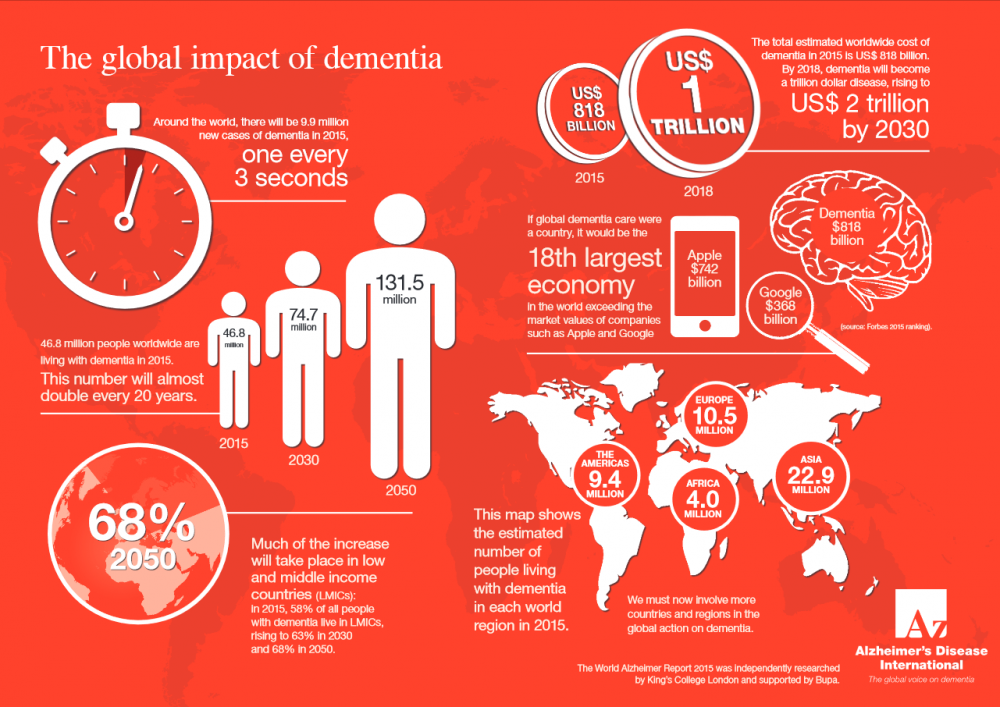
Source: https://www.alz.co.uk/sites/default/files/pdfs/global-impact-dementia-infographic.pdf
Is DEEPE significant?
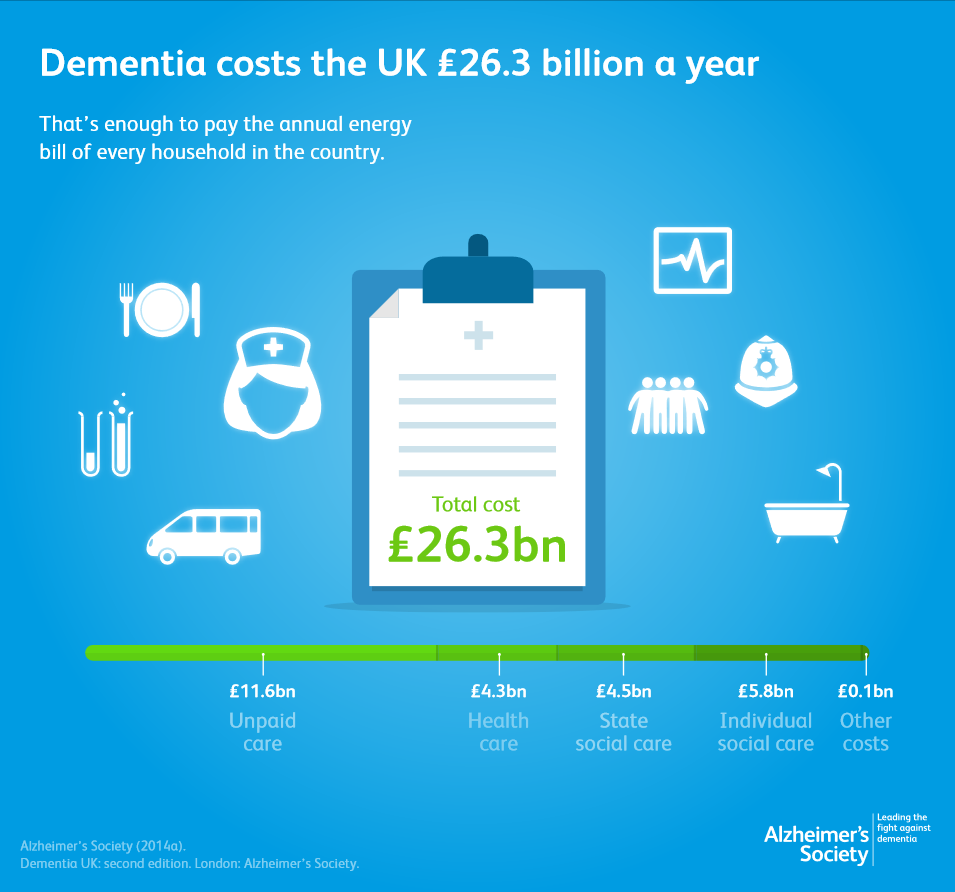
Source: https://www.alzheimers.org.uk/about-us/policy-and-influencing/dementia-uk-report
Is DEEPE relevant for Scotland?
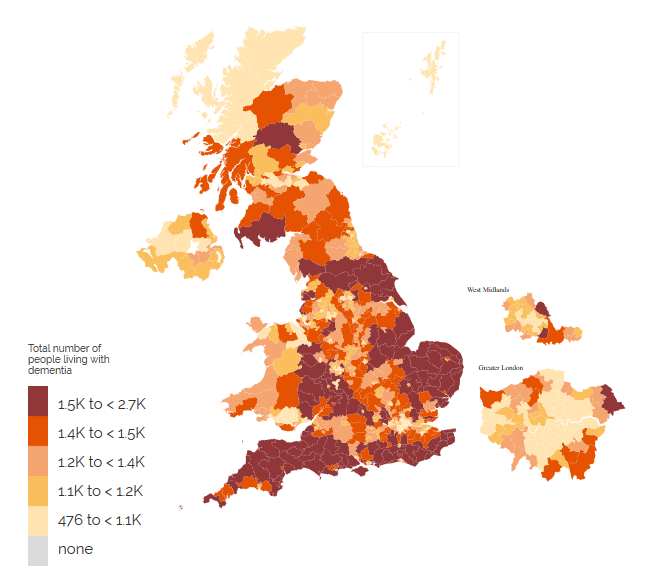
Source: https://www.dementiastatistics.org/statistics/dementia-maps/
Teaching and learning resources for DEEPE
The teaching and learning resources for DEEPE are laid out in the following format with each semester specifying the level within the Promoting Excellence Framework.
|
Knowledge Development |
Pedagogical Approach |
| Introduction to DEEPE | Lead lecture 1 |
| An overview on dementia | Lead lecture 2 |
| Barbara's Story (episode 1) | Interactive discussion 1 |
| Dementia Friends' training | Interactive discussion 2 |
| Sensory and cognitive impairment in older adults | Simulation |
| Recommended Learning Resources for Self-learning | Skill development | Evidence for portfolio |
|
Dementia Awareness This NHS Education for Scotland resource consists of 6 brief DVDs that aims to improve dementia awareness, knowledge and skills at the Informed level of practice within the Promoting Excellence Framework. https://dementiapartnerships.com/resource/informed-about-dementia-dvd/ |
The simulation on sensory and cognitive impairments in older people supports experiential learning to develop insights and the necessary skills to care for patients with these impairments. |
Attendance at all taught and interactive sessions. Reflective Account 1: Barbara’s Story (Episode 1) Participation in the simulation workshop. |
|
Knowledge Development |
Pedagogical Approach |
| The role of Third Sector for Dementia care in Scotland | Lead lecture 3 |
| Improving Community Connections for People living with Dementia within a remote and rural context | Lead lecture 4 |
| Dementia Carer’s Perspectives | Interactive discussion 3 |
| An Overview on Dementia | Quiz 1 |
|
Recommended Learning Resources for Self-learning |
Skill development | Evidence for portfolio |
|
Tools to promote Person Centered Dementia Care 1. The Butterfly Scheme The Butterfly Scheme for hospitals has been devised and promoted by Barbara Hodkinson and is an opt-in scheme that helps people with dementia or symptoms of dementia to receive more appropriate treatment and consideration during a hospital stay. http://butterflyscheme.org.uk/ 2. Getting to Know Me Jointly developed by Alzheimer Scotland's network of Dementia Nurse Consultants and the Scottish Government, this tool aims to give hospital staff a better understanding of patients with dementia who are admitted to hospital either electively or in an emergency. https://www.alzscot.org/information_and_resources/information_sheet/3472_getting_to_know_me 3. Life Story Life story work in dementia care involves people with dementia (and/or their families and care workers) recording aspects of their past and present lives, either for personal use, or to improve care. It enables people living with Dementia to communicate their histories and identities. https://www.york.ac.uk/spru/projects/life-story-feasibility/ http://eprints.whiterose.ac.uk/95286/1/Life_Story_Work_in_Dem |
Skills to provide Person Centered Dementia Care. |
Attendance at all taught and interactive sessions. Completion of Quiz 1 with 85% required for a pass. |
|
Knowledge Development |
Pedagogical Approach |
| Barbara’s Story (Episode 2) | Interactive discussion 4 |
| Assessment of Cognition, Function and Behaviour in Dementia | Lead lecture 5 |
| Think Capacity, Think Consent | Interactive discussion 5 |
|
Recommended Learning Resources for Self-learning |
Skill development | Evidence for portfolio |
|
Nothing Ventured, Nothing Gained Risk Guidance for People with Dementia. This document by the Department of Health, UK provides guidance on best practice in assessing, managing and enabling risk for people living with dementia: Think Capacity, Think Consent This interactive learning resource will enhance your knowledge of how the Adults with Incapacity (Scotland) Act 2000 is applied in Acute General Hospitals, particularly in relation to capacity and consent to treatment. |
Skills to use a range of assessment tools to assess cognition, function and behaviour in dementia. |
Attendance at all taught and interactive sessions. Reflective Accounts 2 & 3: Barbara’s Story (Episode 2) Think Capacity, Think Consent – Scenario Based Questions |
|
Knowledge Development |
Pedagogical Approach |
| Barbara’s Story (Episode 3 and 4) | Interactive discussion 6 |
| Think Delirium | Lead lecture 6 |
|
The 3 Ds – Dementia, Delirium and Depression Stress and Distress in Dementia |
Lead lecture 7 |
|
Polypharmacy: Impact on cognition |
Lead lecture 8 |
|
The 3 Ds - Dementia, Delirium and Depression |
Quiz 2 |
|
Recommended Learning Resources for Self-learning |
Skill development | Evidence for portfolio |
|
https://www.nes.scot.nhs.uk/media/857092/dementia_skilled_final.pdf This learning resource has 5 modules that will help you consolidate your learning on Dementia on DEEPE at Skilled Level within the Promoting Excellence Framework. |
Skills to differentiate between Dementia, Delirium & Depression Skills to recognise signs of Stress and Distress to both prevent and manage those crisis points. |
Attendance at all taught and interactive sessions. Completion of Quiz 2 with 85% required for a pass. |
|
Knowledge Development |
Pedagogical Approach |
| The Triangle of Care and Six Senses Framework using a Case Study | Small Group Work 1 |
| Environments & Assistive Technology for people living with dementia using virtual environments | Small Group Work 2 |
|
Recommended Learning Resources for Self-learning |
Skill development | Evidence for portfolio |
|
The Guide and Self-Assessment tool are both specifically aimed at acute hospital wards and services to enable professionals to identify carers’ needs and support them to ensure the best positive care outcomes for the patient and the carer: https://professionals.carers.org/triangle-care-dementia This is a comprehensive and user – friendly online resource to highlight the significance of the role of a Dementia – Inclusive environment for Dementia Practice: https://www2.health.vic.gov.au/ageing-and-aged-care/dementia-friendly-environments https://www.kingsfund.org.uk/projects/enhancing-healing-environment/ehe-in-dementia-care |
Skills to recognise and assess needs for dementia carers’ support. Skills to audit a dementia care environment using standardised tools. |
Attendance at Small Group Discussions followed by presentations |
|
Knowledge Development |
Pedagogical Approach |
| Barbara’s Story (Episodes 5 & 6) | Interactive discussion |
| End of Life Care in Dementia | Lead lecture 9 |
|
Recommended Learning Resources for Self-learning |
Skill development | Evidence for portfolio |
|
A guide to workforce development to support social care and health workers to apply the common core principles and competences for end of life care (Resources from England and Scotland): |
Skills to recognise End of Life care needs for people living with dementia and support them and their carers through this phase of the Dementia Journey. | Attendance at all taught and interactive sessions Reflective Account 5: Barbara’s Story (Episodes 5 & 6) |
Portfolio of evidence
Click here to download
| Student name: | Registration number: | Campus |
| Signature of student | Date | Signature of Personal Academic Tutor | Date | |
| Lead Lecture 1: Introduction to DEEPE | ||||
| Lead Lecture 2: An overview on Dementia | ||||
| Interactive Discussion 1: Barbara’s Story (Episode 1) | ||||
| Reflective Account 1: Barbara’s Story (Episode 1) | ||||
| Interactive Discussion 2: Dementia Friends’ Training & Certification | ||||
| Simulation: Sensory and Cognitive Impairment in older adults |
Click here to download
| Student name: | Registration number: | Campus |
| Signature of student | Date | Signature of Personal Academic Tutor | Date | |
| Lead Lecture 3: The role of Third Sector for Dementia care in Scotland | ||||
| Lead Lecture 4: Improving Community Connections for People living with Dementia within a remote and rural context | ||||
| Quiz 1: An Overview on Dementia | ||||
| Interactive Discussion 3: Dementia Carer’s Perspectives |
Click here to download
| Student name: | Registration number: | Campus |
| Signature of student | Date | Signature of Personal Academic Tutor | Date | |
| Interactive Discussion 4: Barbara’s Story (Episode 2) | ||||
| Lead Lecture 5: Assessment of Cognition, Function and Behaviour in Dementia | ||||
| Interactive Discussion 5: Think Capacity, Think Consent | ||||
| Reflective Accounts 2 & 3: Barbara’s Story (Episode 2) | ||||
| Think Capacity, Think Consent – Scenario Based Questions |
Click here to download
| Student name: | Registration number: | Campus |
| Signature of student | Date | Signature of Personal Academic Tutor | Date | |
| Interactive Discussion 6: Barbara’s Story (Episodes 3 & 4) | ||||
|
Lead Lecture 6: Think Delirium The 3 Ds – Dementia, Delirium & Depression |
||||
| Lead Lecture 7: Stress and Distress in Dementia | ||||
| Lead Lecture 8: Polypharmacy: Impact on cognition | ||||
| Quiz 2: The 3 Ds - Dementia, Delirium & Depression | ||||
| Reflective Account 4: Barbara’s Story (Episodes 3 & 4) |
Click here to download
| Student name: | Registration number: | Campus |
| Signature of student | Date | Signature of Personal Academic Tutor | Date | |
| Small Group Work 1: The Triangle of Care and Six Senses Framework using a Case Study | ||||
| Small Group Work 2: Environments & Assistive Technology for people living with dementia using virtual environments |
Click here to download
| Student name: | Registration number: | Campus |
| Signature of student | Date | Signature of Personal Academic Tutor | Date | |
| Interactive Discussion 7: Barbara’s Story (Episodes 5 & 6) | ||||
| Lead Lecture 8: End of Life Care in Dementia | ||||
| Reflective Account 5: Barbara’s Story (Episodes 5 & 6) |
Learning outcomes
| Semester | Level within the Promoting Excellence Framework | Learning outcomes (Knowledge) | Learning outcomes (Skills/ability) |
| Semester 1 | Informed Practice Level | ||
| The Dementia Informed Practice Level provides the baseline knowledge and skills required by all workers in health and social services settings including a person's own home. |
Students will be able to:
|
Students will be able to:
|
|
| Semester 2 | Skilled Practice Level | ||
| The Dementia Skilled Practice Level outlines the knowledge and skills required by all health and social services workers who have direct and/or substantial contact with people who have dementia. |
Students will be able to:
|
Students will be able to:
|
|
| Semester 3 | Skilled Practice Level | ||
| The Dementia Skilled Practice Level outlines the knowledge and skills required by all health and social workers who have direct and / or substantial contact with people with dementia. |
Students will be able to:
|
Students will be able to:
|
|
| Semester 4 | Skilled Practice Level | ||
| The Dementia Skilled Practice Level outlines the knowledge and skills required by all health and social services who have direct and/or substantial contact with people who have dementia. |
Students will be able to:
|
Students will be able to:
|
|
| Semester 5 | Enhanced Dementia Practice | ||
| The Enhanced Dementia Practice Level outlines the knowledge and skills required by health and social care workers who have more regular and intense contact with people with dementia, provide specific interventions, and/or direct and manage care and services for people with dementia. |
Students will be able to:
|
Students will be able to:
|
|
| Semester 6 | Enhanced Dementia Practice | ||
| The Enhanced Dementia Practice Level outlines the knowledge and skills required by health and social care workers who have more regular and intense contact with people with dementia, provide specific interventions, and/or direct and manage care and services for people with dementia. |
Students will be able to:
|
Students will be able to:
|